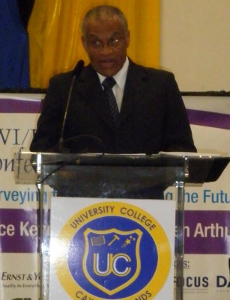Archive for March, 2012

New director of immigration boards and work permits
 (CNS Business): The newly appointed Director of Boards and Work Permits, Kimberley Davis, says her top overall aims are improving efficiencies and decreasing processing times. These key initiatives will entail collaborating with the respective chairpersons to enhance the productivity of the Work Permit Board, the Business Staffing Plan Board and the Caymanian Status and Permanent Residency Board, according to a GIS release, which notes that her office also works closely with the Department of Employment Relations (DER). Davis takes up the position within the Department of Immigration today (Monday, 26 March) and now manages over 40 staff members in this section. Read more on CNS Business
(CNS Business): The newly appointed Director of Boards and Work Permits, Kimberley Davis, says her top overall aims are improving efficiencies and decreasing processing times. These key initiatives will entail collaborating with the respective chairpersons to enhance the productivity of the Work Permit Board, the Business Staffing Plan Board and the Caymanian Status and Permanent Residency Board, according to a GIS release, which notes that her office also works closely with the Department of Employment Relations (DER). Davis takes up the position within the Department of Immigration today (Monday, 26 March) and now manages over 40 staff members in this section. Read more on CNS Business
Ritz developer sued over loan
 (CNS): Updated with court document — Having lost control of the Ritz Carlton, Grand Cayman, local developer Michael Ryan (on right of picture) is now being sued by the same company that has taken over the resort against a loan of almost US$234 million used to build it. According to documents filed in the Cayman Islands Grand Court last week, the current owner of the loan, RC Cayman Holdings, is seeking payment from Ryan as the company states that he is the guarantor for that loan. According to the suit, the US registered company is seeking from Ryan the amount of the loan, plus interest on the principal amount of over US$1 million, which it says is already outstanding, plus dailyinterest of over $48,000 until the loan is paid.
(CNS): Updated with court document — Having lost control of the Ritz Carlton, Grand Cayman, local developer Michael Ryan (on right of picture) is now being sued by the same company that has taken over the resort against a loan of almost US$234 million used to build it. According to documents filed in the Cayman Islands Grand Court last week, the current owner of the loan, RC Cayman Holdings, is seeking payment from Ryan as the company states that he is the guarantor for that loan. According to the suit, the US registered company is seeking from Ryan the amount of the loan, plus interest on the principal amount of over US$1 million, which it says is already outstanding, plus dailyinterest of over $48,000 until the loan is paid.
The writ states that Ryan was required to pay RC Cayman Holdings the outstanding cash by 15 March, just a few days after KPMG had been appointed as receivers for the various companies owned by Ryan that were involved in the development of Cayman’s only five star resort. The company states that Ryan signed as guarantor of the original loan in April 2007 and had “irrevocably and unconditionally” guaranteed the payment of the full amount of the debt but failed to do so on demand.
RC Cayman bought the loan in question from Column Financial in May of last year. On 17 February the company filed a writ of summons in the Grand Court to prevent Ryan and various other defendants from interfering with its efforts to seize control of the Ritz. Some days later KPMG issued a statement revealing that two of its auditors had been appointed as joint receivers of the hotel.
Meanwhile, as Ryan faces mounting legal problems with the owner of the loan, his various companies still owe the Cayman Islands government $6 milllion in outstanding duty payments. According to correspondence between the financial secretary’s office and Ryan released to CNS following an FOI request, the developer had ceased making payments on the outstanding debt in the immediate wake of the 2009 election.
Although he had made regular payments from 2007 until the first quarter of 2009 during the PPM administration, on the appointment of a UDP government Ryan immediately stopped the payments and attempted to tie the money owed to the public purse with his desire to buy the land at Safehaven.
See related articles:

Activists plan West Bay rally
 (CNS): Updated – Saturday's Rally has now been cancelled as a result of a funeral. The various local groups that are opposed to the closure of the West Bay Road and the relocation of Grand Cayman’s landfill to Bodden Town are not giving up on their campaign and are planning a second motorcade followed by a rally in West Bay next Saturday. In an effort to try and stop government signing the deal with the Dart Group, known as the ForCayman Investment Alliance, activists are stepping up the opposition. Following the success of the first motorcade on 17 March, which attracted considerable support, the activists hope there is still a chance to preserve the road, despite the recent preliminary agreement signed between the NRA, government and Dart.
(CNS): Updated – Saturday's Rally has now been cancelled as a result of a funeral. The various local groups that are opposed to the closure of the West Bay Road and the relocation of Grand Cayman’s landfill to Bodden Town are not giving up on their campaign and are planning a second motorcade followed by a rally in West Bay next Saturday. In an effort to try and stop government signing the deal with the Dart Group, known as the ForCayman Investment Alliance, activists are stepping up the opposition. Following the success of the first motorcade on 17 March, which attracted considerable support, the activists hope there is still a chance to preserve the road, despite the recent preliminary agreement signed between the NRA, government and Dart.
Activists have persistently raised concerns that the alliance is heavily tipped in favour of the developer and that, despite claims to the contrary, the road closure will limit access to the last remaining open and undeveloped stretch of Seven Mile Beach. The plan to open a new landfill site in Bodden Town instead of dealing with the dump at its current location in George Town, as originally proposed by government, has also raised concerns, not just in the district but among the wider public as well.
Government has not yet moved to a final agreement with Dart on the project, but it has signed the deal for the developer to begin the Easterly Tibbetts Highway extension and eventual closure of around 4,000 feet of the West Bay Road, which included a cash donation to the government of $5 million.
The controversial pre-deal was signed before government completed a value for money study, currently being undertaken by KPMG, or before the legal processes regarding the sale of crown has been completed.
Activists hope that in spite of the pre-deal they can still prevent the ultimate closure of the road and the moving of the dump and are calling on the community to join them this coming weekend. The motorcade will begin at the cricket pitch in George Town at 4pm and travel to West Bay. The main rally will then take place at the lot opposite Foster’s Republix at 7pm.
For more details see flyer posted below.

Critical dive patient dies in hospital
(CNS): Updated — A 51-year-old female resident has died after being admitted to hospital in a critical condition on Friday afternoon. Police confirmed the death of the woman Monday, stating she had died on Friday evening. Pamela Jean Langevin was taken to the hospital when she collapsed after a dive. At about 12:35pm Thursday afternoon the police were informed that she had had difficulties during a dive at the Turtle Reef off North West Point, in West Bay. Langevin was able to reach shore with her dive partner but became unconscious and had difficulty breathing. Staff from Sun Divers responded and assisted. CPR and Oxygen was administered prior to the arrival of emergency services.
A police spokesperson said her death was under investigation by the RCIPS Marine Dept.

No evidence in Baker case
 (CNS): The man arrested in connection with the suspected murder of Kerran (KerryAnn) Baker last November has been released from police bail conditions as there is no evidence to charge the 35-year-old man, police said Friday. However, an RCIPS spokesperson stated that the enquiry into the disappearance of the 25-year-old Jamaican nurse “remains very active” and officers recently visited Jamaica to meet with her family and officials there. Although Kerran's body has never been found, police suspect that she was murdered following her suspicious disappearance from her home in Bodden Town last July and the discovery of her car parked close to the Pedro cliffs a few days later.
(CNS): The man arrested in connection with the suspected murder of Kerran (KerryAnn) Baker last November has been released from police bail conditions as there is no evidence to charge the 35-year-old man, police said Friday. However, an RCIPS spokesperson stated that the enquiry into the disappearance of the 25-year-old Jamaican nurse “remains very active” and officers recently visited Jamaica to meet with her family and officials there. Although Kerran's body has never been found, police suspect that she was murdered following her suspicious disappearance from her home in Bodden Town last July and the discovery of her car parked close to the Pedro cliffs a few days later.
“Although no trace of Kerran has been found, the circumstances surrounding her disappearance and the findings of the enquiry team to date have led the RCIPS to treat this case as a murder,” police said Friday.
Officers leading the hunt were in Jamaica this week to provide her parents, siblings and fiancée with a comprehensive update on the progress of the investigation, the spokesperson added. During the visit officers also met with officials from the Ministry of Foreign Affairs and the Jamaica Constabulary Force.
A recent report in the Jamaicanpress revealed that Kerran's parents had concerns about the investigation and had approached the Jamaican government to intervene in the investigation into the suspected murder of their daughter.
Kerran's stepfather told the Jamaican Observer that the family had approached the Jamaican government to stop the investigation dying out.
So far, only one arrest has been made in the eight month long enquiry. The man who was arrested after an operation in Prospect last November has since been released from his bail conditions, police said, as, “at this stage, there is insufficient evidence to proceed” towards charges.
“Kerran's family have been made aware of the development and remain extremely supportive of the RCIPS and the determination of the enquiry team to bring this case to a successful conclusion,” the police added in the latest update about the case.
Kerran was last seen shopping at Foster's Airport supermarket on 30 July, where she was captured on CCTV. The Jamaican practice nurse was reported missing by a friend when she and other friends of Kerran’s were unable to make contact with her. When her friends gained access to her apartment, they found partially unpacked groceries and Kerran's purse on the counter. It was apparent that Kerran had been interrupted by something or someone as she was putting away the shopping and left her apartment with just her phone and car keys.
Her vehicle was discovered in Pedro St James a few days after her disappearance and the keys to the car in bushes nearby.
Anyone who has any information in relation to the disappearance of Kerran is asked to contact George Town police station on 949-4222, the RCIPS tip-line 949-7777, or Crime Stoppers 800-8477 (TIPS).

Clue to male baldness discovered
 (BBC): A biological clue to male baldness has been discovered, raising the prospect of a treatment to stop or even reverse thinning hair. In studies of bald men and laboratory mice, US scientists pinpointed a protein that triggers hair loss. Drugs that target the pathway are already in development, they report in the journal Science Translational Medicine. The research could lead to a cream to treat baldness. Most men start to go bald in middle age, with about 80% of men having some hair loss by the age of 70. The male sex hormone testosterone plays a key role, as do genetic factors. They cause the hair follicles to shrink, eventually becoming so small that they are invisible, leading to the appearance of baldness.
(BBC): A biological clue to male baldness has been discovered, raising the prospect of a treatment to stop or even reverse thinning hair. In studies of bald men and laboratory mice, US scientists pinpointed a protein that triggers hair loss. Drugs that target the pathway are already in development, they report in the journal Science Translational Medicine. The research could lead to a cream to treat baldness. Most men start to go bald in middle age, with about 80% of men having some hair loss by the age of 70. The male sex hormone testosterone plays a key role, as do genetic factors. They cause the hair follicles to shrink, eventually becoming so small that they are invisible, leading to the appearance of baldness.
Now, researchers at the University of Pennsylvania have analysed which genes are switched on when men start to go bald.

Crane reaches dizzy heights over Seven Mile Beach
 (CNS): The crane being used by the general contractors on a Seven Mile Beach condominium broke local records this week when it was extended up to 202 feet, becoming the tallest structure in the Cayman Islands. The crane’s extension comes ahead of the anticipated completion of what will be the country’s tallest residential building. Following a controversial amendment to the planning law in 2010 that now allows developers to exceed the seven story limit up to as many as ten floors in the main tourist zone, the developers of WaterColours immediately adapted their plans to take advantage of the extra floors. Read more on CNS Busines
(CNS): The crane being used by the general contractors on a Seven Mile Beach condominium broke local records this week when it was extended up to 202 feet, becoming the tallest structure in the Cayman Islands. The crane’s extension comes ahead of the anticipated completion of what will be the country’s tallest residential building. Following a controversial amendment to the planning law in 2010 that now allows developers to exceed the seven story limit up to as many as ten floors in the main tourist zone, the developers of WaterColours immediately adapted their plans to take advantage of the extra floors. Read more on CNS Busines

Miller: CHEC deal won’t pay
(CNS): Despite the claims by the premier that the proposed deal with China Harbour Engineering Company to build the George Town cruise port facilities will bring a better return for the people of the Cayman Islands, the independent member for North Side says the figures just don’tadd up. Ezzard Miller claims that over the roughly fifty year life of the deal government is considering with the Beijing based firm the public purse could lose out by as much as a half a billion dollars. When compared to the previous proposal, Miller says CHEC will be taking money from passenger fees over fifty years, which will see Cayman lose out.
Based on average expected arrival figures, despite giving back 40% in the second 25 year period, public coffers will still be worse off than the deal proposed by GLF Construction, which was a smaller, less costly project where the developer would have covered its costs and return within 25 years.
The premier has claimed, however, that because the cost of the financing the project proposed by CHEC will be much cheaper than the one proposed by GLF and government will begin to reap the benefit sooner. He has said that on top of the amount of work that will be generated by the actual development and the anticipated economic stimulus it will create, the Chinese will begin giving back 40% of the takings to the public purse after the first 25 years.
McKeeva Bush has also stated that Caymanians will be offered an opportunity to own shares in the development and therefore earn a direct profit from the cruise berthing project.
However, Miller says he has spent significant time analysing the figures and says that no matter which way government dresses it up, the public will lose out in the CHEC deal. On top of the immense competition that will be created for existing George Town traders with the proposed 100,000 sqft of retail space on the upland development, the public coffers will also suffer as a result of the length of the deal and the money CHEC will be taking from fees.
The GLF proposal was estimated to cost around $195 million while the CHEC proposal is currently estimated to be around $300 million, though this has not yet been confirmed and could be considerably more. Based on the estimated fee take Miller says, in the first 25 years under the GLF proposal government would receive just over $395M in income from the ports, compared to just over $324M from CHEC.
But it is the second 25 year period where government would lose out most, said Miller. If government had struck a deal with GLF, the developer would have handed over the ownership of the facility, having already covered the costs of financing and a return on its investment, he said.
With the CHEC deal, however, government will continue on in partnership with the firm, and although it will be receiving a 40% share of the profits, the income to government in the second 25 year block with an anticipated arrival figure of 1.6 million passengers per annum, government will receive only $507M, rather than the more than $1B it would have received, the independent member pointed out.
Miller told CNS that government must re-think the CHEC deal. Despite Bush's claims that it is the best proposal for Cayman, it will not only see local retailers suffer from the competition from the upland development but will also significantly reduce the take to the public purse.
Government has still not revealed the finer details of its current discussions with China Harbour and KPMG are currently engaged in a value for money study on the proposal. The premier and his spokesperson on the project, Ellio Solomon, have both indicated that they hope to move to a main agreement with CHEC over the next few weeks.
See proposed CHEC plans for cruise berthing facility here

Premier to battle one man, one vote in public forum
 (CNS): As a keen defender of the voting status quo, Premier McKeeva Bush will be going publicly head to head with Opposition Leader Alden McLaughlin and independent member, Ezzard Miller, next week over the question of the introduction of one man, one vote in Cayman. Local think tank Generation NOW will be hosting the panel discussion on the topical issue next Thursday, which will also feature Adrianne Webb, who was one of the Electoral Boundaries Commission members, along with UDP supporter and election commentator, Dick Arch. The forum is open to the public and organisers say that, given the line-up, it promises to be a lively discussion.
(CNS): As a keen defender of the voting status quo, Premier McKeeva Bush will be going publicly head to head with Opposition Leader Alden McLaughlin and independent member, Ezzard Miller, next week over the question of the introduction of one man, one vote in Cayman. Local think tank Generation NOW will be hosting the panel discussion on the topical issue next Thursday, which will also feature Adrianne Webb, who was one of the Electoral Boundaries Commission members, along with UDP supporter and election commentator, Dick Arch. The forum is open to the public and organisers say that, given the line-up, it promises to be a lively discussion.
"We believe that we have selecteda panel of persons who have been outspoken on this issue from a variety of perspectives that reflects a cross-section of our community as a whole," said Olivaire Watler, one of the directors of the activist group which seeks to promote higher education and opportunities for young Caymanians.
The non-governmental organisation has hosted several round table discussions on a number of thorny subjects that have encouraged the local community to begin openly debating some of the country’s more controversial issues, from gambling to taxation.
With McKeeva Bush still opposed to the principle of one man, one vote and Miller spearheading a campaign that is just a few hundred signatures away from triggering the country’s first ever people initiated referendum on the subject, the discussion question "One Man, One Vote: Now, Later or Never?” is likely to generate an evening of interesting discourse.
“Along with Mr Ezzard Miller, who has initiated the petition to introduce one man, one vote, the premier and the leader of the opposition will weigh in on the issue,” Watler said. “We will also have a valuable resource in Ms Adriannie Webb, attorney and member of the Electoral Boundaries Commission, which considered the pros and cons of single-member and multi-member constituencies, and Mr Dick Arch as an informed member of the public who is well known for, amongst other things, his long experience as a general elections radio commentator and his considered contributions on the subject."
The round table, which is open to the public, will take place on Thursday, 29 March, at 7:00pm at the Harquail Theatre and will be moderated by Crosstalk’s Austin Harris.
Organiser's also stated that the discussion will be aired on Radio Cayman but people wishing to attend the live forum will be asked for a $5 contribution to the cost of the event.

CJ warns of judicial threats
 (CNS): Full speech now attached — Cayman’s chief justice warned of emerging threats to the independence of the regional judiciary during a presentation at a UCCI conference Thursday. Anthony Smellie said the trend towards extra-judicial bodies overseeing judges, such as Cayman’s Judicial Legal Services Commission (JLSC), had the potential to encroach on their autonomy and to have a negative influence on their impartiality. In a presentation that emphasised the importance of an independent judiciary to modern democracies, Smellie warned against complacency as he pointed to other encroachments, including the removal of the local legal aid budget under the edict of ‘nation building’ here in Cayman.
(CNS): Full speech now attached — Cayman’s chief justice warned of emerging threats to the independence of the regional judiciary during a presentation at a UCCI conference Thursday. Anthony Smellie said the trend towards extra-judicial bodies overseeing judges, such as Cayman’s Judicial Legal Services Commission (JLSC), had the potential to encroach on their autonomy and to have a negative influence on their impartiality. In a presentation that emphasised the importance of an independent judiciary to modern democracies, Smellie warned against complacency as he pointed to other encroachments, including the removal of the local legal aid budget under the edict of ‘nation building’ here in Cayman.
In a lunchtime presentation at the UCCI 50/50 conference in the Sir Vassel Hall, the Cayman Islands top judge warned that, despite the relative stability of the judiciary in the Caribbean, the independence of judges was under threat around the world and there was no room for complacency because there were examples very close to home that continued to threaten its impartiality.
He said an immediate and apparent danger was a “new kind of judicial control” which had the potential to intrude upon judicial insularity from external influences. He pointed to Cayman’s own JLSC, which he said was “in the midst of trying to unravel the Gordian knot” of disciplinary control of judges.
Smellie pointed out that where the trend for disciplinary control of judges had emerged, such as in the UK, Canada and the US, it was recognized that any such process should remain within the judiciary in order to maintain the important separation of powers between the legislature, the executive and the judiciary.
He said if the disciplinary regime is to be imposed from outside, the public was likely to question the ability of judges to remain impartial if it were to have a legal case regarding the external regulator.
The senior judge pointed out that the judiciary already had more oversight and checks and balances, because of the appellant system, than any other public office. “Judges sit in the open glare of public scrutiny — scrutiny by the immediate parties involved and by the media on behalf of the public,” the chief justice told the UCCI conference audience. “It is no doubt also due to the fact that judges are amenable to having their decisions immediately reviewed by way of appeal.”
By the very nature of what they do, the chief justice said, judges are already accountable in many ways, “more accountable than the public officials of any other branch of government.” The chief justice explained that the separation of powers “contemplates that the judiciary will hold its members accountable to the law” through the powers of “appellate review and not through a process of inquisitorial oversight and sanction,” he added.
Smellie questioned if the trend of disciplinary control of judges was likely to be for the public good when it was weighed against the dangers to judicial independence and he said there were already dissenting voices in other jurisdictions. He pointed to the extraordinary dangers in small jurisdictions of the erosion of impartiality since it could invite dissatisfied litigants to harass judges who rule against them. And while the authorities may dismiss complaints based only on the merits of a decision, he pointed out that a review would still be required which may incline a judge to avoid rendering controversial decisions while the investigation ran its course
“Any disciplinary system that allows or encourages interested parties to strike out at judges is too great an interference with judicial impartiality to be tolerable under the doctrine of separation of powers,” Smellie warned, adding that no disciplinary system should be imposed that would interfere with a judges ability to be independent.
Smellie also spelt out the fundamental importance of an independent judiciary to uphold the law, the people’s rights and to facilitate business and economic stability. He said an independent judiciary was able to ensure “that powerful individuals must conform to the law” and that no one is either above or below the law.
As well as the threat that judicial inpendence faced from the encroachment of the executive with extra-judicial disciplinary bodies, the chief justice pointed to the budget constraints that the judiciary faced around the region. He said that while Cayman was luckier than some jurisdictions where judges had to go to judicial ministers for approval of every penny they spent, its vulnerability to political control was illustrated by the recent diversion of the entire legal aid budget away from the courts “by way of ministerial edict” for “nation building purposes”.
Although he said that the money had now been re-instated, the chief justice described the move by the premier during the budget process in October 2009 in which he took control of the legal aid budget under his ministry.
“This was said to be justified in part out of a sense of political umbrage that the courts should not be spending money on expensive lawyers ‘to get criminals off the hook’. And this was although the lawyers are paid at the minimal rates prescribed by Cabinet itself,” he said, as he explained the move occurred despite the fact that the local courts are charged by law and under the constitution with the administration of justice.
Smellie explained that the delivery of legal aid is an essential part of that since most criminal defendants cannot afford to pay their own lawyers.
“While the position with legal aid has since been restored to the status quo ante, the episode certainly gave the impression that the political directorate did not regard the administration of justice as an important priority and did not understand the need for institutional independence of the judiciary as a vital aspect of its ability to administer justice," the chief justice said.
He warned that it was but one example of how the judiciary needed to be insulated from political control.